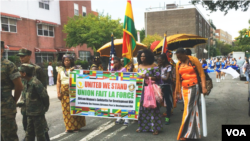Over the last two decades, New York City has seen a surge in immigration from Africa. But until recently, newcomers from Sierra Leone, the Ivory Coast, Liberia, Guinea, Ghana other West African nations mostly kept to their own communities. Today, these diverse cultures are coming together to celebrate their common roots, and to demand recognition as a force within the "Big Apple."
Between the traditional drums, the vivid multicolored native dress, the many tribal dialects and the sheer merriment and pride on display at the African Diaspora Parade last weekend, it sometimes seemed a lot more like Mother Africa than the Bronx, New York.
Mali-born Bourema Niambele, who helped plan the event, swayed and marched with other dignitaries at the front of the procession.
“We are coming here to today to celebrate the African diaspora. As Africans in the diaspora, it doesn’t matter where you are born. We all can come together to celebrate our culture," said Niambele.
The parade ended in a park, where an all-afternoon festival of music and dance gets underway.
That is as it should be, said Ngande Ambrose, a Cameroon-born dancer and community leader in an heirloom ceremonial hat that expresses his kingly lineage. For him, Africa itself is a festival.
“Africa is just a land of happiness and joy despite all the problems that have evolved in that part of the world. We still have a happiness dominating in our way of doing things. I am a dancer. Africans have dance in their blood. So they move. We don’t need training. We don’t go to dance school for that. We just dance,” said Ambrose.
Festival organizers say the African Diaspora includes anyone with cultural roots on the continent. That includes Hispanics, whose rhumba and cha-cha dances, for example, are based in African rhythms, and African Americans, whose dialects and traditional foods echo the motherland. And for Jamaicans like Sadie Campbell, and other West Indians, the link to Africa runs very deep.
“We have a part of Africa that is in us. We come from there. That’s in our genes. We’re proud of that,” said Campbell.
The event also embraced American culture; high school drum corps and hip hop music were part of the day’s entertainment.
Charles Cooper, a Liberian American, is chairman of the African Advisory Council, a coalition of Bronx based community advocacy groups that co-sponsored this celebration. He said creating these connections is what the event is really all about.
“You realize the similarities. This is an event where it’s fun. Folks come out. Folks dance. Folks laugh. People that normally would not speak to one another who will pass by one another, in this environment, they are speaking to one another. They're chatting and they are sharing information,” said Cooper.
Karl Rodney, publisher of the Carib News, said that as common ground between these diverse groups gets clearer, the information they share gets more political.
“There is a growing awareness that the barriers that separated us previously - African Americans, Caribbean Americans, Continental Africans, or Hispanics - are all false. The agenda is the same. If you want services or a cab, they are not asking where you’re from - the Caribbean or Africa. You are black! So if we look at ourselves in partnership in terms of the black or African Diaspora, that’s where we see the potential for even more political influence. That’s a growing trend. And that is a growing reality,” said Rodney.
If, as activists hope, immigration into New York continues to rise, along with the increasing sophistication and unity among African Diaspora groups, it seems likely that this community’s political power will continue to grow as well. And with it, perhaps, the wealth of African communities back home.
